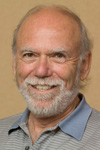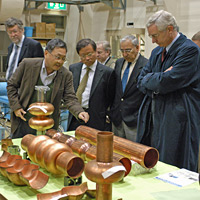Director's Corner
30 November 2006
 Barry Barish |
FALC — What’s in the Name?
I attended a meeting hosted by KEK Laboratory in Tsukuba, Japan on 19 November of the "Funding Agencies for Large Colliders" (FALC), previously known as "Funding Agencies for the Linear Collider." The change of names for FALC has caused more than a little consternation within the ILC community. At our recently concluded GDE / ECFA meeting in Valencia, Spain, FALC chairman Roberto Petronzio was directly asked about the name change in his opening plenary presentation. He responded with a rather general statement about FALC's mission and goals. This, however, did not put the issue to rest. Richard Wade, PPARC Director of Programmes and Chair of the FALC Resource Group, was even more pointedly challenged during the town meeting a couple of days later with a somewhat rhetorical question concluding that the name change indicates FALC is backing off from its raison d'être (e.g. the ILC). Today, I discuss a few highlights from the recent FALC meeting and give my personal view of what's in the name of FALC.
 "What's in a name? That which we call a rose by any other word would smell as sweet." from Shakespeare’s "Romeo and Juliet" (II, ii, 1-2) |
 Kenji Saito shows FALC representatives superconducting RF cavity research being done at KEK. |
A key item and one that stimulated much discussion at the recent FALC meeting is defining the governance for their organisation, and in particular, they discussed a draft of "Terms of Reference." Such a mission statement will go a long way toward defining FALC and its role and objectives in representing the ILC (and HEP) to funding agencies. Some details of the terms of reference are still under discussion within FALC, and I will discuss them once they have been finalised
In the absence of the terms of reference, let me confine my remarks today to my interpretation of the name change. I believe this change is primarily motivated by the realisation that the ILC cannot be viewed or represented in isolation from the priorities, commitments, time scales and available resources established in the different regions of the world. Therefore, it is argued that in order to represent the ILC, FALC must be well informed and must realistically take into account other large projects and regional commitments. FALC also believes that it is important for the ILC to be brought forward in the broadest possible context. In order to marshal the necessary support from other communities, FALC has decided to promote a study of the potential technological impacts of Superconducting RF technology on other scientific fields and industry.
Only time will tell how FALC will evolve and whether the new name and broadened scope will make it more or less effective on behalf of the ILC. Nevertheless, I find a couple of actions from the recent meeting encouraging and strongly suggestive of FALCs continuing very strong focus on the ILC: 1) FALC endorsed our proposal that there be a high-level international review of the ILC Reference Design Report (RDR) and Costing, and they will support it by suggesting members for the review committee. 2) FALC has scheduled a special meeting on 22 January in London in order to receive a first-hand preview and give us feedback on the ILC RDR. This meeting will be in advance of our GDE meeting in Beijing in February, when we expect to approve the RDR for public release.
-- Barry Barish